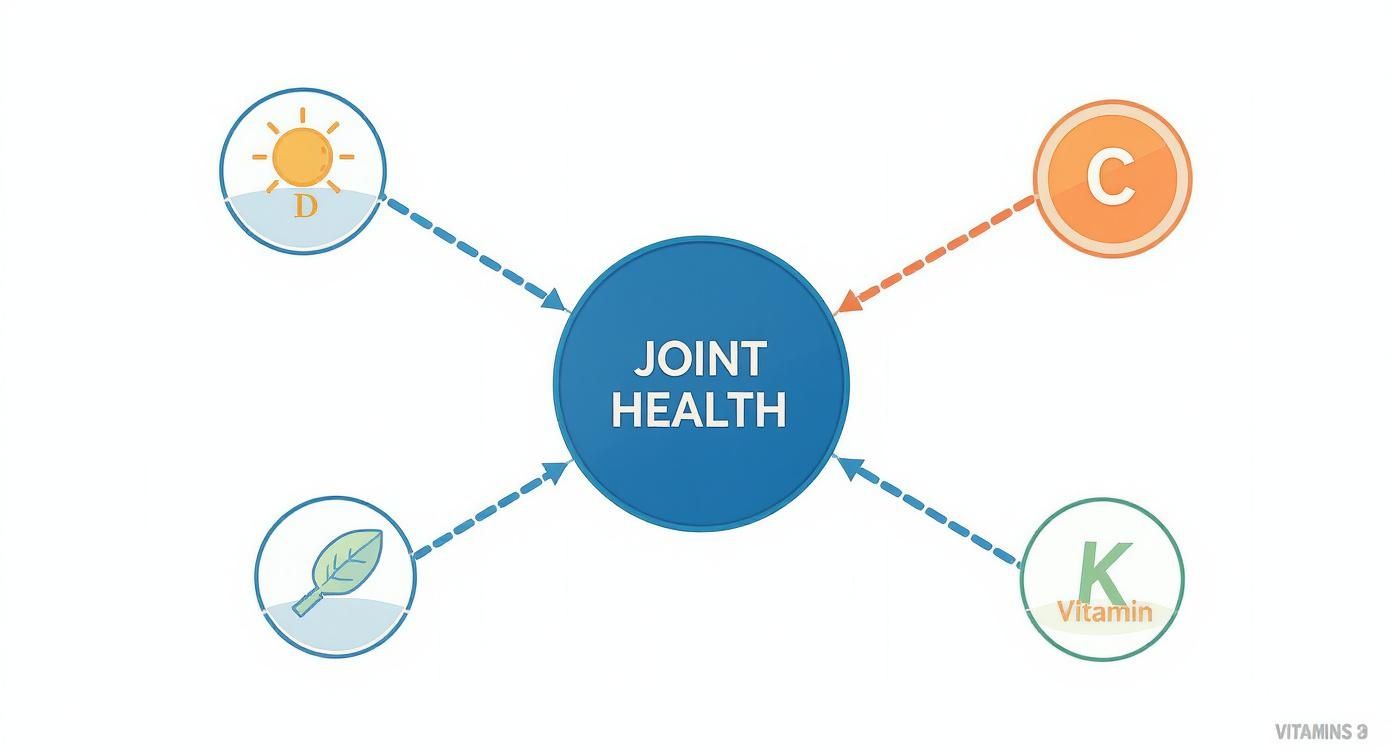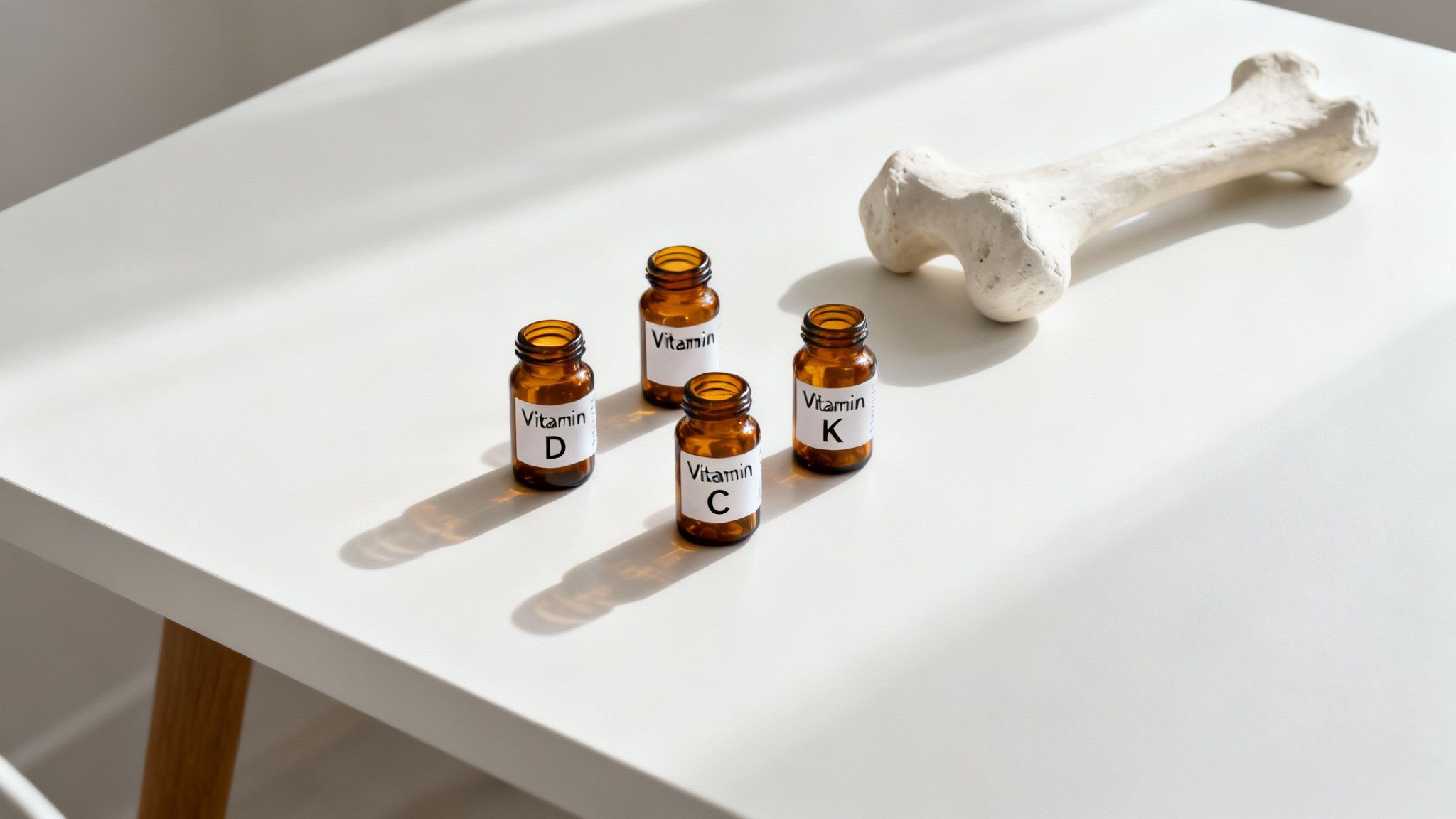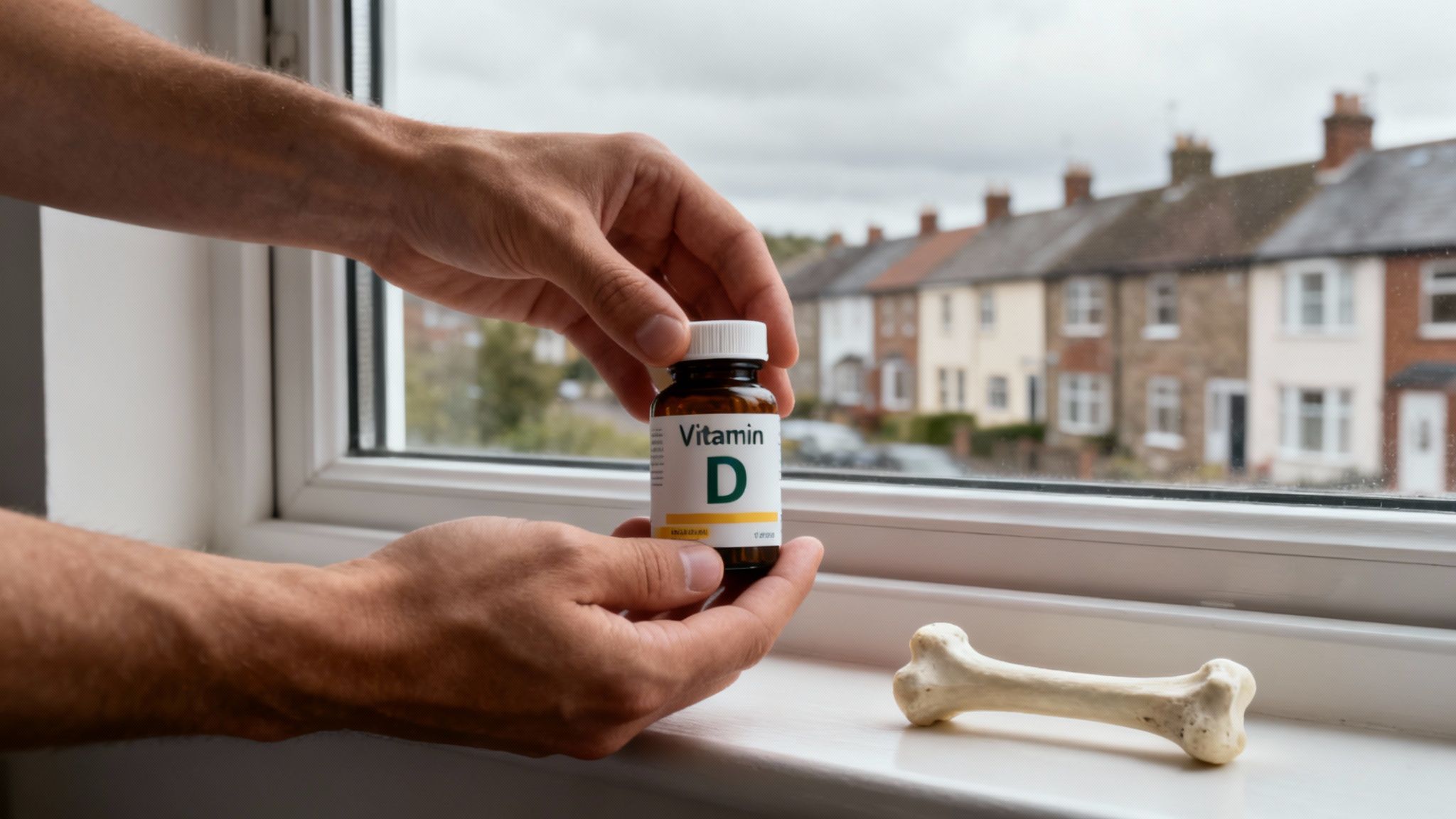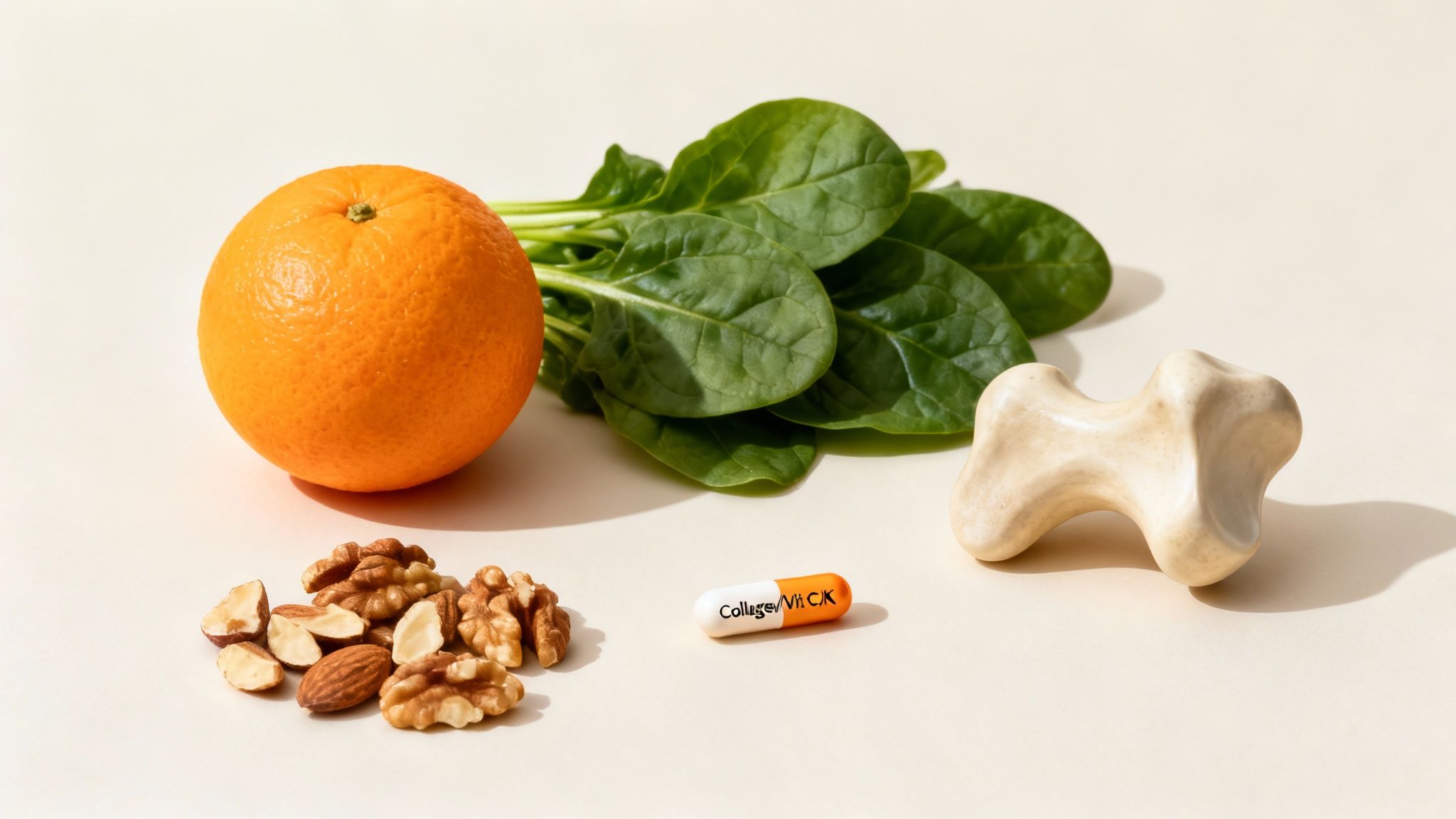
Finding the Best Vitamin for Joints in the UK
Share
It's tempting to search for that one single best vitamin for joints, but the truth is, you're looking for a team, not a solo hero. A powerful trio—Vitamins D, C, and K—work together to support the entire joint structure, from bone to cartilage. Each has a distinct and crucial job, but it's their synergy that really counts for long-term joint resilience.
Understanding the Foundation of Joint Health
Think of your joints like a well-oiled machine. Just as a car needs the right fluids to run smoothly, your joints need a specific cocktail of nutrients to function without stiffness or discomfort. Neglect any one of them, and the whole system starts to feel the strain, leading to aches, pains, and less mobility.
When it comes to joint support, three vitamins really lay the groundwork:
-
Vitamin D: Often called the "sunshine vitamin," this one is like the site foreman for your bones. It’s in charge of making sure your body can actually absorb and use calcium to build a strong bone framework—the very structure your joints depend on.
-
Vitamin C: This is your master builder. Without enough Vitamin C, your body simply can't produce collagen, the essential protein that gives your cartilage its shock-absorbing strength and flexibility.
-
Vitamin K: Think of this vitamin as the traffic controller for calcium. It expertly guides calcium into your bones and teeth, making sure it doesn't end up in soft tissues like your arteries or the joint cartilage itself, where it could cause more harm than good.
This infographic paints a great picture of how this team works in harmony to keep your joints healthy.

As you can see, each vitamin takes a slightly different path, but they all lead to the same goal: keeping your joints moving freely and comfortably. Grasping how they work together is the first real step towards building a solid nutritional plan.
Key Vitamins for Joint Health at a Glance
To make it even clearer how these nutrients team up, here's a quick summary of their main roles and where you can find them in your diet. Think of this table as your cheat sheet before we dive deeper into how each one contributes to lasting joint health.
| Vitamin | Primary Role in Joint Health | Common Food Sources |
|---|---|---|
| Vitamin D | Crucial for calcium absorption, building the strong bones that form the foundation of your joints. | Fatty fish (salmon, mackerel), egg yolks, fortified foods, and a bit of sunshine. |
| Vitamin C | Essential for producing collagen, the protein that makes up cartilage, tendons, and ligaments. | Citrus fruits (oranges), bell peppers, strawberries, broccoli, and kiwi. |
| Vitamin K | Directs calcium to the bones and helps with bone mineralisation, keeping cartilage clear. | Leafy green vegetables (kale, spinach), broccoli, and Brussels sprouts. |
Remember, this is just a starting point. While these vitamins are fundamental, everyone's needs are different.
Why Vitamin D Is So Important for UK Joint Health

So, let's talk about Vitamin D, especially for those of us living under the often-grey skies of the UK. Think of your joints like a house. The bones are the foundation, and without a solid foundation, the whole structure becomes unstable and starts showing cracks. That’s where Vitamin D comes in.
Its main job is to act as a gatekeeper for calcium, letting your body absorb this crucial mineral which is the primary building block for strong bones. A sturdy skeleton is non-negotiable for supporting healthy cartilage and the entire joint system. This alone makes Vitamin D a top contender for the best vitamin for joints—it secures the very framework they depend on.
The problem? In the UK, getting enough Vitamin D from its best source—sunlight—is a real challenge. Our northern latitude and notoriously cloudy weather mean that from October to early March, the sun simply isn't strong enough for our skin to produce it.
The Great British Sunlight Problem
This lack of consistent, powerful sunlight isn't a minor inconvenience; it's a nationwide health issue. When your Vitamin D levels dip, your body's ability to absorb calcium takes a nosedive, which can directly weaken your bone density over time.
Weak bones put extra stress on the joints they support, potentially accelerating the wear and tear on the cartilage that cushions them. It's a domino effect that can have serious long-term consequences for your mobility.
For anyone already dealing with joint problems, this becomes even more critical. Reduced mobility often means less time outdoors, which can lead to lower Vitamin D levels. This creates a vicious cycle where achy joints contribute to the very deficiency that weakens their bony support.
The connection between low Vitamin D and UK joint health is well-established. A major review in the annals of the Royal College of Surgeons of England revealed a shocking statistic: a staggering 84.7% of elderly patients undergoing knee or hip replacements in the UK had insufficient Vitamin D. Experts highlight that people with joint issues are often less mobile and spend less time outside, making them particularly vulnerable in our climate. You can read the full research about these findings on joint health and Vitamin D levels.
UK Government Advice: Time to Supplement
Recognising this widespread risk, the UK government and its Scientific Advisory Committee on Nutrition (SACN) have issued very clear guidance. It's now officially recommended that everyone over the age of four should consider taking a daily supplement containing 10 micrograms (400 IU) of Vitamin D throughout the autumn and winter.
This isn't just a friendly tip; it's a vital public health message aimed at protecting the nation's bone and muscle health. For those with limited sun exposure all year—like people who are housebound or cover their skin for cultural reasons—this advice applies year-round.
This official guidance really hammers home the need to be proactive. Relying on your diet and the unpredictable British sun just isn't enough to maintain the levels needed for strong bones and well-supported joints.
Choosing the Right Vitamin D Supplement
When you start looking at supplements, you'll mainly find two forms: D2 (ergocalciferol) and D3 (cholecalciferol). While both will raise your Vitamin D levels, the science points to D3 being more effective. It's also the exact form your body naturally produces when exposed to sunlight.
- Vitamin D2: Typically comes from plant sources like mushrooms.
- Vitamin D3: Usually derived from animal sources like lanolin (from sheep's wool) and is considered more potent and bioavailable.
For this reason, most health experts and quality supplements, including VitzAI's high-quality Vitamin D3 formulation, use the D3 form to ensure you get the best possible absorption. Following the UK's guidelines is a simple but powerful step you can take to build a stronger foundation for your joints and protect your mobility for years to come.
Does Vitamin D Supplementation Actually Work?

This brings us to the million-dollar question: if you start taking Vitamin D, will your joints actually feel better? It's a fair point. You want to know if the effort and expense will pay off in less stiffness and better mobility. The scientific evidence, however, paints a more complex picture than a simple "yes" or "no."
While correcting a Vitamin D deficiency is absolutely crucial for your bone health—the very foundation of your joints—the direct link to relieving joint pain or repairing cartilage is less clear-cut. It’s important to go into this with realistic expectations and understand what the science truly says.
Let’s be clear-eyed about the research. Major clinical trials have put Vitamin D supplements to the test, looking specifically at conditions like osteoarthritis (OA), a common cause of joint pain where cartilage breaks down. The results? Well, they've been mixed.
What Clinical Trials Reveal About Joint Pain
Here’s the thing: many large-scale studies have struggled to show a direct, significant benefit of Vitamin D on joint pain or arthritis progression in people who are not deficient. That’s a critical distinction. Bringing your levels up from "low" to "normal" is one thing; expecting extra Vitamin D to act like a painkiller is quite another.
A landmark three-year, double-blind, randomised trial is a perfect example. It involved 474 patients over 50 with knee osteoarthritis and found that daily supplements of 800 IU of Vitamin D didn't significantly slow the rate of joint space narrowing—a key marker of arthritis progression—compared to a placebo. Participants also reported no major improvements in pain or function over the three years. You can discover more insights about these clinical findings.
This is precisely why managing expectations is so important. Vitamin D isn't a "magic pill" for sore joints, but it remains a fundamental nutrient for the entire system that supports them.
Understanding Joint Space Narrowing
To make sense of these studies, it helps to understand a term you’ll often see: joint space narrowing (JSN). Imagine the space between the bones in your knee is filled with a thick, rubbery cushion—that’s your cartilage. In osteoarthritis, this cartilage wears down and gets thinner.
On an X-ray, this looks like the bones are getting closer together; the "space" between them is narrowing.
- Healthy Joint: Shows a clear, wide space between the bones, indicating thick, healthy cartilage.
- Arthritic Joint: Shows a much smaller, narrowed space, a sign of cartilage loss and potential bone-on-bone contact.
When studies conclude that Vitamin D didn't prevent JSN, it means it didn't halt this physical process of cartilage breaking down. This is a crucial piece of the puzzle when we're talking about the best vitamin for joints.
The key takeaway from the research is this: While ensuring you have adequate Vitamin D is non-negotiable for preventing bone loss and supporting musculoskeletal health, the evidence that it directly repairs damaged cartilage or eliminates existing joint pain is not strong.
The Verdict on Vitamin D for Joints
So, where does that leave us? It's best to think of Vitamin D’s role in a more foundational way. It’s not the emergency repair crew that rushes in to fix a damaged joint; it’s the long-term maintenance team making sure the building's foundation (your bones) remains solid and stable.
A strong foundation reduces undue stress on the entire structure, which indirectly supports joint health over a lifetime. For this reason, supplementing with Vitamin D, especially here in the UK, is a proactive, preventative measure. It ensures your bones are strong enough to support your joints, even if it doesn't reverse existing cartilage damage.
For anyone seeking the best vitamin for joints, the message is clear. Start by making sure your Vitamin D levels are where they should be to support your bone structure. This is the first, most critical step in any joint health strategy, setting the stage for other nutrients and lifestyle changes to do their work.
The Unsung Heroes of Cartilage Health
While Vitamin D gets a lot of the limelight for building strong bones, it definitely doesn’t work in isolation. A whole team of unsung heroes—Vitamins C, K, and E—is busy behind the scenes, directly supporting the health and resilience of your cartilage. That's the very cushion your joints rely on, and these nutrients are essential for its repair, protection, and proper function.
Think of Vitamin C as the master craftsman for your joints. Its most critical job is helping your body produce collagen, the strong, fibrous protein that acts like scaffolding for your cartilage, ligaments, and tendons. Without enough Vitamin C, your body’s ability to repair these vital connective tissues basically grinds to a halt.
This makes it a non-negotiable part of any chat about the best vitamins for joints. Keeping a steady supply helps maintain the structural integrity and shock-absorbing capacity of your cartilage.
The Power of Collagen Synthesis
Every time you move, you place a bit of stress on your joints. Over time, this leads to microscopic wear and tear on your cartilage. Your body is constantly working to patch up this damage, and collagen is the main raw material it uses for the job.
Simply put, no Vitamin C means no new collagen. This can lead to weaker cartilage that’s more vulnerable to damage, potentially speeding up the wear-and-tear process we associate with joint discomfort.
To keep your collagen production lines running smoothly, try to pack your diet with plenty of Vitamin C-rich foods.
- Citrus Fruits: Oranges, grapefruits, and lemons are the classic go-tos.
- Berries: Strawberries, blueberries, and raspberries are loaded with both Vitamin C and antioxidants.
- Bell Peppers: Believe it or not, a red bell pepper contains more Vitamin C than an orange.
- Leafy Greens: Kale and spinach are great for topping up your daily intake.
- Broccoli: This versatile veg is another Vitamin C powerhouse.
Vitamin K: The Calcium Traffic Controller
Next up is Vitamin K, which has a very different but equally important role. If Vitamin D is the foreman getting calcium onto the building site (your body), then Vitamin K is the traffic controller, directing that calcium exactly where it needs to go.
Its main job is to activate proteins that help bind calcium to your bones, making sure your skeleton stays dense and strong. Just as importantly, it also helps stop calcium from being deposited in soft tissues, like your arteries or, crucially, your joint cartilage.
This protective role is vital. Calcium deposits in cartilage can cause it to stiffen and become brittle, stopping it from cushioning your joints properly. Vitamin K helps keep your cartilage supple and working as it should.
Vitamin E: The Antioxidant Protector
Finally, let’s talk about Vitamin E. This nutrient acts as a potent antioxidant, working a bit like a security guard for your joint cells. It helps shield them from oxidative stress, a type of cellular damage caused by unstable molecules called free radicals.
Inflammation in the joints can generate a flood of these free radicals, creating a vicious cycle of damage. Vitamin E steps in to neutralise them, protecting the delicate cartilage cells from harm and supporting a healthier joint environment.
While Vitamin D's role in bone health is foundational, it's this team of unsung heroes that directly tackles the day-to-day maintenance of your cartilage. For a complete approach to joint care, you simply can’t overlook them. Their combined actions help ensure your joints are not just supported by strong bones but are also resilient, flexible, and well-protected from the inside out. This is why a balanced diet, full of a variety of nutrients, is always the best strategy.
Although the evidence for Vitamin D supplements directly slowing joint degeneration is mixed, data still links low levels to worse outcomes. A UK-based study showed that people with the lowest Vitamin D intake had a 12.6% rate of radiographic knee arthritis progression, compared to just 5.1% in those with the highest intake. For some women, a serum level below 50 nmol/L was significantly associated with increased joint space narrowing—a key sign of cartilage loss. Learn more about these UK-based joint health findings.
A Holistic Plan for Stronger Joints

Vitamins are a massive part of the joint health equation, but they’re just one piece of a much bigger puzzle. To really build resilient, comfortable joints, you need a strategy that looks beyond single nutrients. The best vitamin for joints works even better when it’s backed up by a smart mix of other key supplements and powerful lifestyle habits.
This complete game plan tackles joint health from every angle—calming inflammation, supporting the muscles around your joints, and easing the physical load on your cartilage. It’s all about creating an environment where your joints can thrive for years to come.
Key Supplements That Complement Vitamins
While vitamins lay the nutritional groundwork, other supplements can offer more targeted support, working in harmony with the nutrients we’ve covered. Think of them as specialised tools that make your core vitamin routine even more effective.
Two of the most impactful additions are Omega-3 fatty acids and magnesium. Each one plays a distinct but complementary role in keeping your joints moving smoothly and comfortably.
-
Omega-3 Fatty Acids: Found in abundance in fish oil, these are nature's anti-inflammatories. They help balance the body’s inflammatory response, which is a major driver of joint stiffness and discomfort. A daily Omega-3 supplement can help soothe overworked joints from the inside out.
-
Magnesium: This essential mineral is a master of muscle function. It helps muscles relax and contract properly, preventing the tightness and strain that can put extra pressure on your joints. Strong, supple muscles act as brilliant shock absorbers, taking the load off your knees, hips, and spine.
When you combine these with your core vitamins, you create a much more complete support system. The vitamins help maintain the structure of bone and cartilage, while these supplements get to work on managing inflammation and muscle tension. For more ideas on creating a synergistic stack, our guide on supplements for bones and joints offers a deeper look.
The Power of an Anti-Inflammatory Diet
Supplements are designed to fill in any nutritional gaps, but your daily diet is the real foundation of long-term health. Adopting an anti-inflammatory eating pattern is one of the most effective things you can do to support your joints. This approach centres on whole, nutrient-dense foods that naturally fight inflammation.
An anti-inflammatory diet isn't about restriction; it's about adding more of the good stuff. It involves loading your plate with colourful fruits and vegetables, healthy fats, and lean proteins that provide the building blocks your body needs to stay strong.
Incorporating the best anti-inflammatory foods can make a huge difference in how your joints feel day-to-day. Key foods to prioritise include:
- Fatty Fish: Salmon, mackerel, and sardines are packed with Omega-3s.
- Berries and Cherries: These fruits are rich in antioxidants that fight cellular stress.
- Leafy Greens: Spinach, kale, and broccoli are loaded with vitamins and minerals.
- Nuts and Seeds: Walnuts, flaxseeds, and chia seeds provide healthy fats and fibre.
- Olive Oil: A cornerstone of the Mediterranean diet, known for its anti-inflammatory properties.
At the same time, it’s a good idea to limit foods known to promote inflammation, like processed snacks, sugary drinks, and refined carbohydrates.
Lifestyle Habits That Make the Biggest Difference
Finally, no chat about joint health is complete without looking at lifestyle. Two factors, in particular, have a massive impact on how your joints feel and function over your lifetime: maintaining a healthy weight and getting regular, low-impact exercise.
1. Maintain a Healthy Weight
Your joints, especially your knees and hips, bear the brunt of your body weight with every single step. Excess weight multiplies the force on these joints, accelerating the wear and tear on cartilage. Even a modest weight loss can bring significant relief, reducing strain and improving mobility.
2. Choose Low-Impact Exercise
Movement is medicine for your joints. Exercise lubricates them, strengthens the surrounding muscles, and maintains your range of motion. The catch? High-impact activities can sometimes do more harm than good.
Low-impact exercises build strength without the jarring stress:
- Swimming and Water Aerobics: The buoyancy of water supports your body, allowing for pain-free movement.
- Cycling: This is a great way to build leg strength while protecting your knees.
- Walking: A simple yet incredibly effective way to stay active and support joint function.
This well-rounded approach—combining foundational vitamins with targeted supplements, an anti-inflammatory diet, and smart lifestyle choices—gives you a complete and actionable plan you can start today for lasting joint care.
Your Joint Health Questions Answered
Diving into the world of supplements can feel a bit overwhelming, and it's natural to have questions. Let's clear up some of the most common queries about using vitamins for joint health, so you can feel confident in the choices you make.
Can I Get Everything My Joints Need from a Multivitamin?
A good quality multivitamin is a fantastic starting point. Think of it as your daily nutritional safety net, making sure you’ve covered the basics like Vitamin C and K for your overall well-being.
However, when it comes to Vitamin D, a standard multi often doesn't cut it, especially for those of us living in the UK. Public Health England is quite clear on this, recommending a separate 10 microgram (400 IU) Vitamin D supplement for most adults right through the autumn and winter.
So, while a multivitamin provides a solid foundation, you'll likely need to add a dedicated Vitamin D supplement to your routine for targeted joint and bone support. If you have a diagnosed deficiency, your doctor might even suggest a higher dose.
How Long Until I Feel a Difference?
It’s really important to manage expectations here. Vitamins aren't a quick fix like painkillers; they’re about playing the long game to support your body's health and resilience. The time it takes to notice any changes really depends on the nutrient and where your levels were to begin with.
For instance, if you're correcting a major Vitamin D deficiency, it could take several weeks, or even a couple of months, to get your levels back into a healthy range. The benefits to your joints and bones will follow, but it's a gradual process.
With vitamins like C and K, their job is more about consistent maintenance and prevention. You might not feel a dramatic shift, but that's the point. Their benefit is in what you don't feel—the slow, steady decline in joint integrity. It's best to see supplementation as a long-term strategy for building stronger, more resilient joints, not an overnight cure.
Are There Any Vitamins I Should Avoid?
While vitamins are generally safe at the recommended doses, you can definitely have too much of a good thing. You need to be particularly careful with high doses of the fat-soluble vitamins—A, D, E, and K—because your body stores them, and they can build up over time.
Even more importantly, some supplements can interfere with prescription medications.
A classic example is Vitamin K, which can mess with the effectiveness of blood-thinning medication like warfarin. This is exactly why it's absolutely essential to have a chat with your doctor or a qualified health professional before starting any new supplement. This is non-negotiable if you have an existing health condition or are on other medications.
This simple step ensures your supplement plan is working for you, not against you.
Which Is More Important: Diet or Supplements?
This is a fantastic question, and the answer couldn't be clearer: diet always comes first. A varied, anti-inflammatory diet packed with nutrient-dense foods gives you a complex symphony of vitamins, minerals, fibre, and other compounds that work together in ways a single pill just can't match.
Food is the foundation. Supplements are designed to do exactly what their name suggests: supplement your diet by filling in any specific gaps.
Vitamin D is the perfect example for us here in the UK. The limited sunlight and lack of strong dietary sources make it almost impossible to maintain good levels all year round through food alone. So, prioritise a healthy diet first, and then use targeted, high-quality supplements to address those specific needs for truly robust joint support.
Ready to build a smarter supplement routine based on your unique needs? The VitzAI questionnaire analyses your age, lifestyle, and health goals to provide personalised recommendations, taking the guesswork out of optimising your health. Discover your personalised stack today at VitzAI.com.
This article is for informational purposes only and is not medical advice. Always consult a qualified health professional before starting any new supplement or major lifestyle change.
